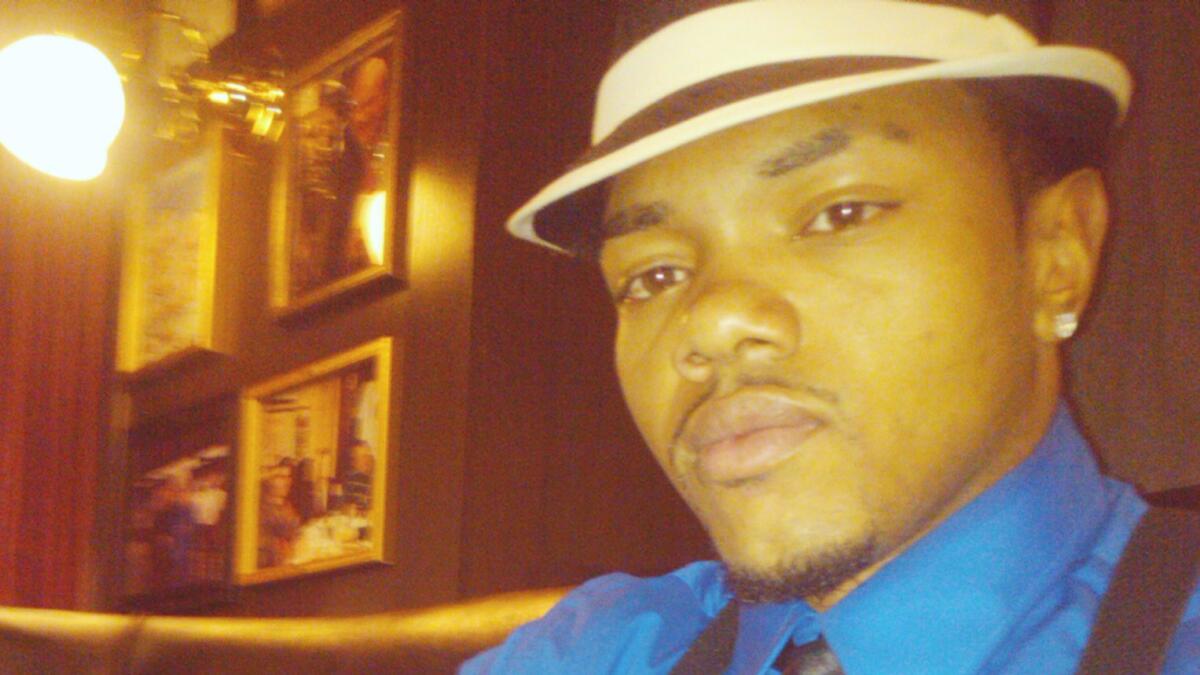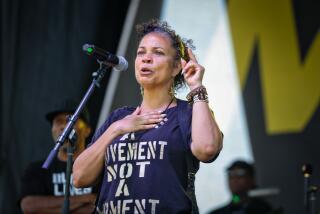A study in anger: How Gavin Long went from decorated Iraq veteran to cop killer

- Share via
Reporting from Kansas City, Mo. — In the leafy neighborhood where he lived on the south side of Kansas City, Mo., Gavin Eugene Long would speed down 77th Terrace on his bicycle, a former Marine sergeant who stayed in shape and never seemed to bother anybody.
That is how neighbors remembered him here on the predominantly black side of the city.
“I’m telling you, there was nothing unusual about him,” said Terrence Horad, 38, whose house sits two doors down from the turquoise bungalow where Long lived. “Nothing confrontational. He was just an average guy.”
But the neighbors didn’t really know him.
The Long who killed three police officers and wounded three others in Baton Rouge, La., on Sunday lived online.
In YouTube videos, he espoused black separatism and advocated violence against white “oppressors,” including police who killed black men. From a studio presumably in Kansas City, he produced podcasts that became increasingly militant in calls for blacks to rise up against an unjust society.
“It’s a time for peace, but it’s a time for war, and most of the times when you want peace, you got to go to war,” he said in one of his videos discussing black separatist movements.
He went by “Cosmo Setepenra” online and ran a blog — ConvoswithCosmo.Com — in which one post might discuss vegetarianism and the next the inferiority of white people, a subject he also explored in three rambling, self-published books.
Now that he is dead — killed by police minutes after the rampage he carried out on his 29th birthday — much of what is known about Long comes from his vast online trail, where he fashioned himself as a lifestyle guru and activist with fans who were aching to know his life story.
As racial tensions escalated nationwide with the police shootings of black men this month in Louisiana and Minnesota, and the killings of five police officers in Dallas, Long’s messages grew more pointed.
“I’m not gonna harp on that, you know, with a brother killing the police,” Long said in a video uploaded the day after the Dallas shootings. “You get what I’m saying?”
“It’s justice,” he said. In the same video, he seemed to hint at his own plans: If “anything happens to me … don’t affiliate me with anybody.”
Two days later, he posted a video in which he claimed to be in Dallas. “Everyone in this room got a purpose,” it shows him shouting to at black men in a barber shop. “Just figure it out!”
Long traveled to Baton Rouge in a white Chevy Malibu he rented in Kansas City, investigators said, and he stayed in the area several days as he plotted his attack.
The Long who lived online emerged from what seemed like a normal path in life.
He grew up in Kansas City, graduated from high school in 2005 and joined the Marines. He wanted to earn money for college and “see the world,” he said in a podcast. He served five years, including two deployments to Iraq.
Records show he served as a data network specialist and received a medal for good conduct.
On July 25, 2009, records show, Long married Aireyona Osha Hill at Pilgrim Chapel, a historic Kansas City wedding venue. They had no children and divorced within two years, at which time Long had a monthly income of $500, according to the filing.
By then, Long had left the military with an honorable discharge and started college. He received an associate’s degree in General Studies at Central Texas College, studied for two semesters at Clark Atlanta University and attended the University of Alabama for a semester.
One class he took in Atlanta was “United States, Africa and the World,” where he earned an A. Meanwhile, he received Cs in algebra and intermediate Spanish, a university official said.
Long halted his studies after having a “spiritual revelation” in which he gave away “all of his material possessions” and traveled to Rwanda, Ethiopia, Uganda, Kenya, Tanzania and Egypt, he wrote on his website.
After returning to Kansas City in 2015, he launched his Twitter and social media accounts. Online, he praised organizations such as Deacons for Defense and Justice, an armed black self-defense group formed in the 1960s.
In May 2015, Long submitted papers in a Jackson County, Mo., court claiming allegiance to the United Washitaw de Dugdahmoundyah Mu’ur Nation. The sovereign citizenry group’s core tenet is that followers are descendants of “ancient ones” who are black and lived in North America tens of thousands of years before white Europeans.
Members believe they are above government laws, dismiss governments as operating illegally and say they do not have to pay taxes or respect law enforcement officials, said Ryan Lenz of the Southern Poverty Law Center’s Intelligence Project.
The documents Long filed amount to “meaningless” paperwork but are customary among sovereign citizens groups, Lenz said.
A man in the driveway of the Oak Park neighborhood address listed for Long’s ex-wife confirmed Monday that Hill lived in the house, which is about a 20-minute drive north of Long’s residence. A woman at the house declined to speak and told a reporter to leave her property, using an expletive.
In addition to posting on his own sites, Long apparently made frequent contributions to other forums. On one website, a user named Cosmo Setepenra complained about government surveillance.
He also appeared to follow at least one online radio show hosted by Lance Scurv, who said he featured a Cosmo Setepenra on his radio show this year in a long conversation about nutrition and health. They stayed in touch, talking on the phone every now and then.
Scurv, who is based in Orlando, Fla., said Cosmo spoke from a phone number with a Kansas City area code. “He seemed to be like a guy in transition,” Scurv said. “But he never expressed rage like there was something brewing.”
On July 9, Scurv posted an email that Cosmo asked him to share on his Facebook group.
It began: “I just want everyone to know that if anything may happen to me or with me ...” The post went on to reference YouTube videos about the police shooting of Alton Sterling and “standing up when you know you are right.”
Scurv said he barely read the email, but shared it because he helps pass along social media updates for everyone who comes on his show, which discusses current events and activism.
Near the end of the post, Long offered a message to readers: “You will win this war not with your actions, but with your responses to their actions.”
On Sunday, at the house where Long lived in Kansas City, a man brandishing a gun warned reporters to leave.
“Unless you have a warrant, get off my property!” a woman at the house yelled to dozens of reporters gathered out front the next day.
Horad, like other neighbors willing to talk about Long, said he was struggling to reconcile Long the killer with Long the man on a bicycle: “What is almost dream-like about all this is that you never know what it could be that would push someone you know — like a neighbor — right over the edge.”
Special correspondent Jenny Jarvie in Atlanta contributed to this report.
ALSO
Baton Rouge had escaped New Orleans’ racial tensions. Then came Alton Sterling.
When are police justified in using deadly force?
From Ferguson to Baton Rouge: Deaths of black men and women at the hands of police
More to Read
Sign up for Essential California
The most important California stories and recommendations in your inbox every morning.
You may occasionally receive promotional content from the Los Angeles Times.












